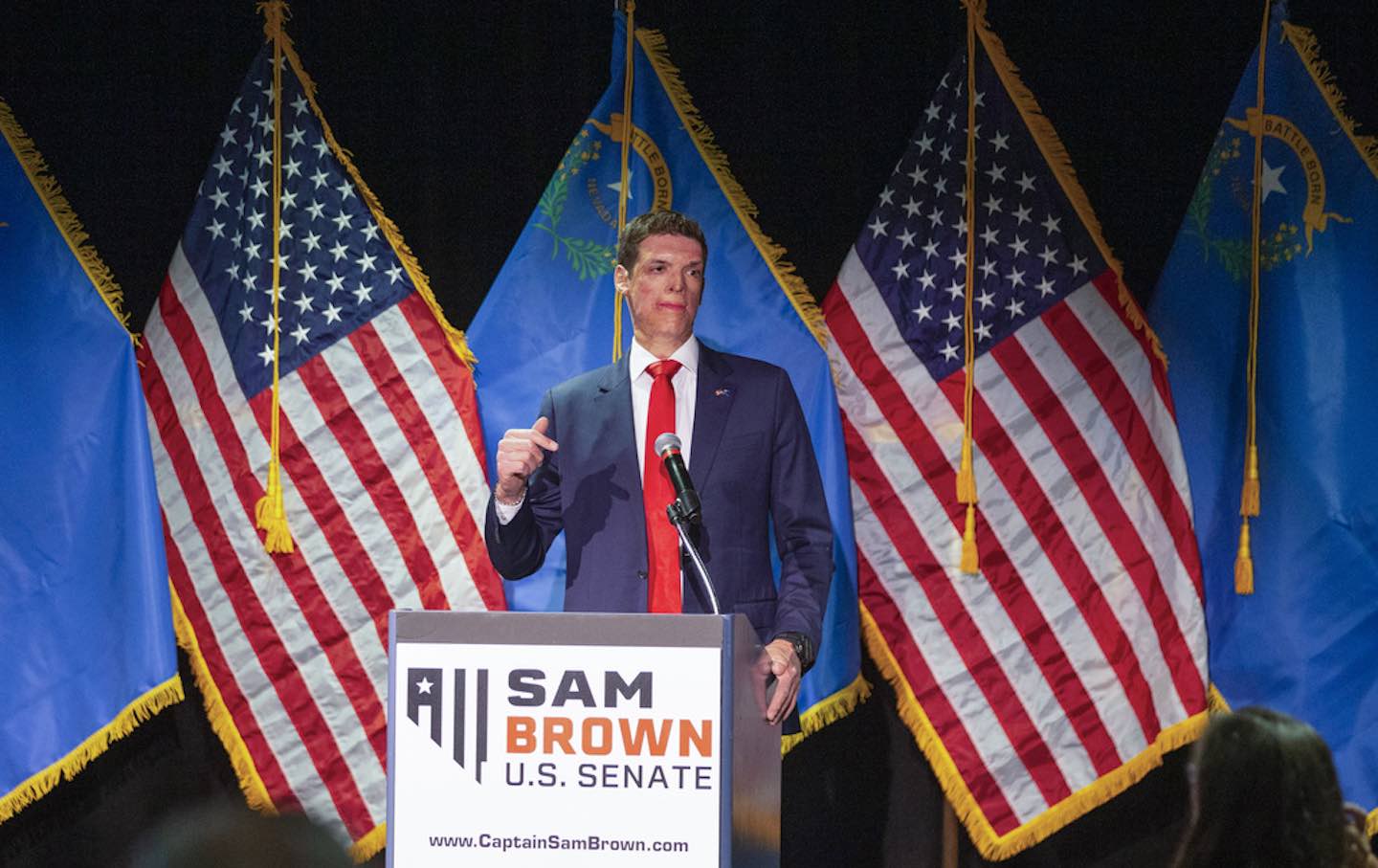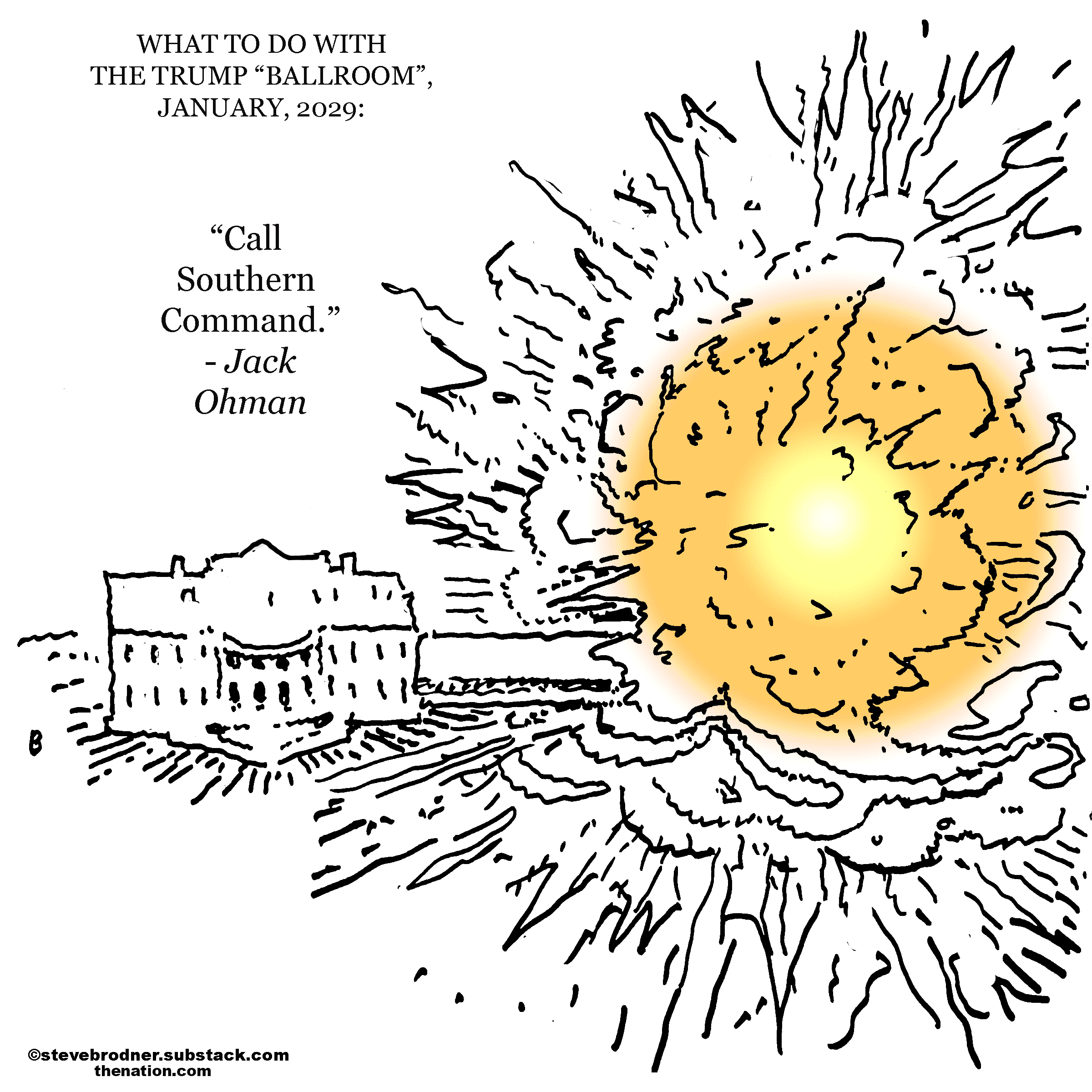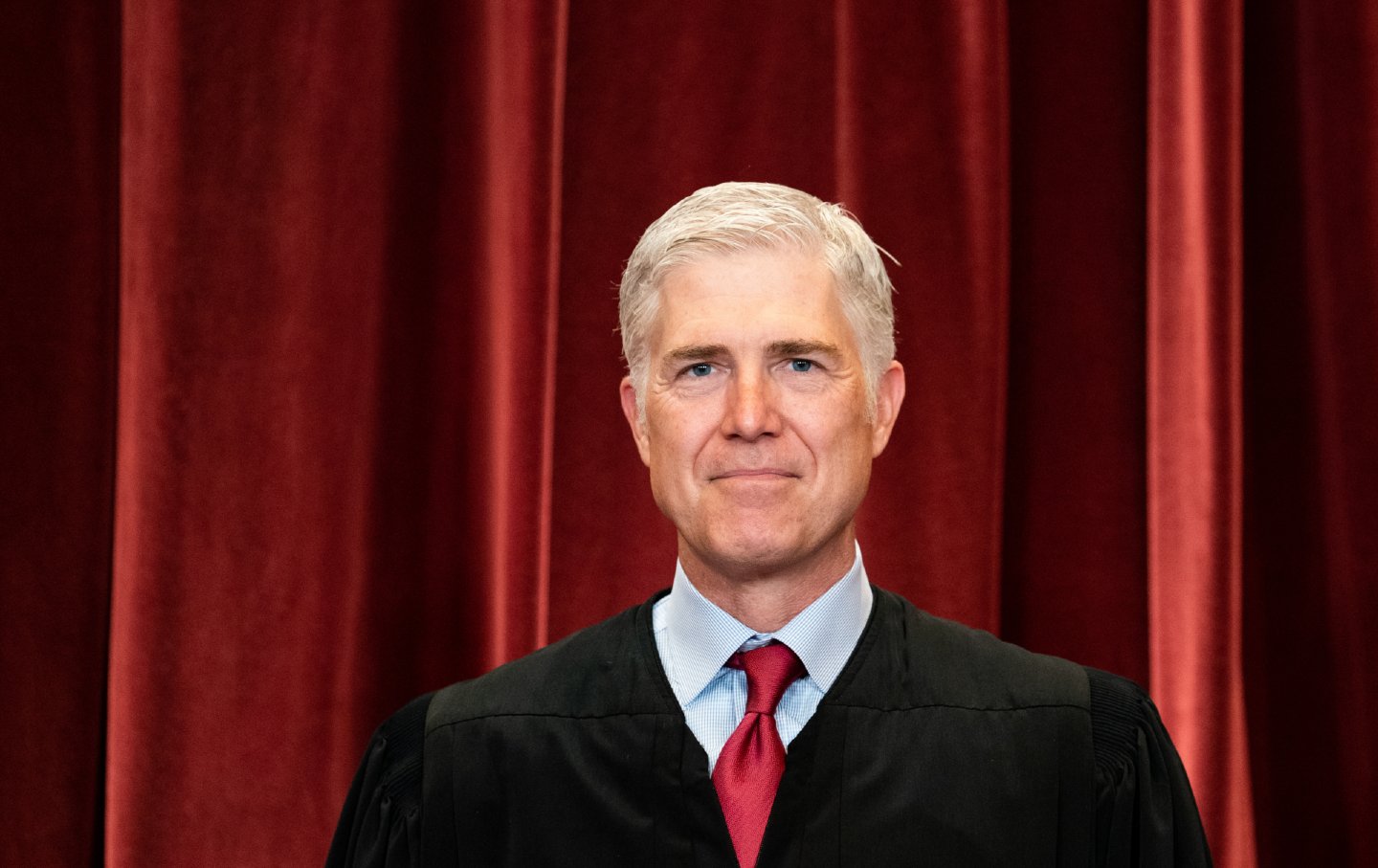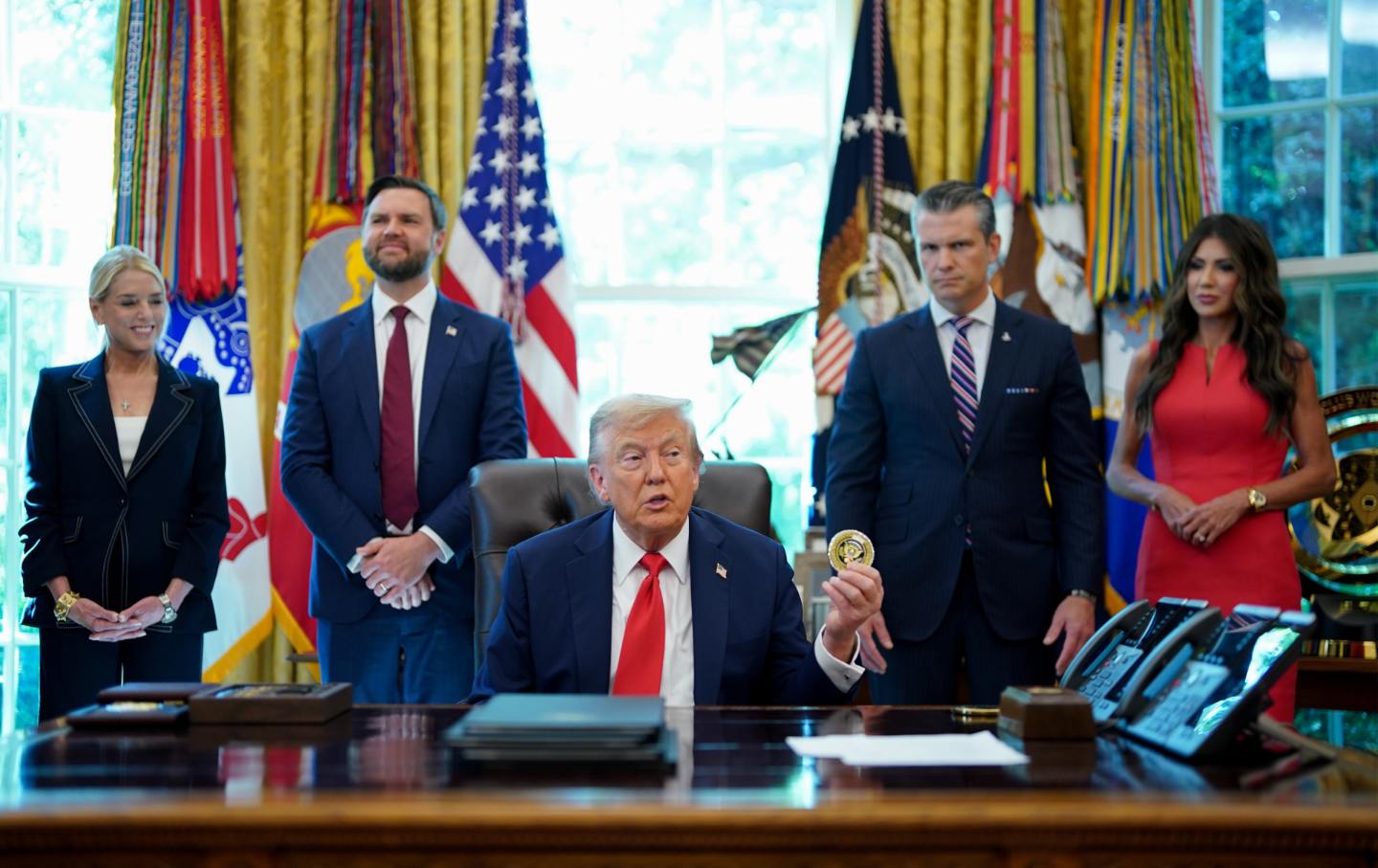
Republican senatorial candidate Sam Brown speaks at an election night party Tuesday, June 11, 2024, in Reno, Nevada.
(Tom R. Smedes / AP Photo)
Two days before Nevada Republicans voted in a primary election that would determine whom their party nominated as the US Senate candidate to run against incumbent Jacky Rosen, Donald Trump endorsed retired army captain Sam Brown. On cue, on Monday of this week Brown won by a landslide, securing almost 60 percent of the primary vote.
Brown was almost killed by a roadside bomb in Afghanistan in 2008; severely burned, he has undergone more than 30 surgeries in the years since, and his face remains visibly marked by the injuries. He’s been attempting to make his way into politics, first in Texas, and more recently in Nevada, for the past decade.
Two years ago, Brown ran in the primaries to take on Nevada’s other senator, Catherine Cortez Masto. He lost that race to former state attorney general Adam Laxalt, who then went on to narrowly lose to Cortez Masto, allowing Democrats to retain control of the upper chamber.
Now, Brown is back. Despite running against a bevy of other Republicans with stronger far-right credentials—Jeff Gunter was Trump’s ambassador to Iceland, Jim Marchant an extreme-right state assemblyman who ran for secretary of state in 2022 on a down-the-line 2020 election-denial platform, and several other lesser candidates also flaunted their MAGA credentials—Brown was the one who secured Trump’s coveted endorsement.
The decision to throw his support to Brown reflects an underreported pragmatic element to Trump’s endorsement decisions this election season. In 2022, the raging ex-president seemed to go out of his way to support the most extreme, even fringe candidates, like Marchant, who appealed to the MAGA base and promised fire and brimstone in their efforts to overturn the 2020 results, but who ended up being roundly rejected in the general election. This time around, he has been more selective.
Brown was late in the game to backing Trump’s reelection bid in 2024, but that didn’t ultimately preclude him from receiving Trump’s endorsement. In part, that might be because he actually needed the endorsement less: From the get-go, he polled strongly in Nevada, coming in with more than 50 percent support and watching his rivals divide up the remaining votes among themselves. In other words, even without Trump’s backing, he polled as a winner. In a potentially pivotal state for both the presidential race and for control of the US Senate, that must have encouraged Trump to board the Brown train.
Now, however, Brown is heading into a general election against an opponent who proved her political chops both in 2016, when she flipped a House seat vacated by Republican Joe Heck, and in 2018, when she defeated Republican Senator Dean Heller, and who has the full backing of the still-legendary machine that former Senator Harry Reid spent decades building up.
Trump and Brown are both seeking to win service-sector votes in a state heavily reliant on jobs in entertainment, hotels, restaurants, bars, and casinos by pushing a policy banning the taxing of tip income. Democrats have, by contrast, focused more on boosting the minimum wage, expanding health benefits, protecting trade union bargaining rights in a strong union state, and, more generally, reforming the tax system so that it doesn’t so heavily favor the wealthy.
Recent polling shows Senator Rosen to be comfortably ahead in this race—and, indeed, to be significantly outperforming a struggling President Biden in Nevada polls. While a couple polls have shown Trump and Biden even, the vast majority of surveys over the course of 2024 have shown Trump out ahead by a significant margin, in a state that was particularly battered by the economic fallout from Covid-era lockdowns and still has higher-than-national-average rates of unemployment. If the election were held tomorrow, Trump would likely win Nevada.
That doesn’t mean, however, that Trump’s a shoo-in for the state in the November election, still nearly five months away. As I wrote earlier this year, pollsters in Nevada—as in neighboring Arizona—have grown increasingly uneasy about how to poll a state with such a high percentage of voters registered as independents. Moreover, the state votes heavily Democrat in state legislative races, and the electorate’s political priorities, especially on high-octane issues like abortion rights, tend to skew blue. The Democratic Party’s ground game is strong. In consequence, many observers of Nevada’s political scene believe that the presidential race is still highly competitive and will only become more so as the election nears and voters start more carefully tuning in.
As importantly, in this calculus, if Rosen does succeed in beating Brown, she will do so with a high turnout that, in theory, ought to produce at least something of a coattails effect for Joe Biden. Poor poll numbers for the president notwithstanding, there is, in other words, still all to play for in Nevada.
Disobey authoritarians, support The Nation
Over the past year you’ve read Nation writers like Elie Mystal, Kaveh Akbar, John Nichols, Joan Walsh, Bryce Covert, Dave Zirin, Jeet Heer, Michael T. Klare, Katha Pollitt, Amy Littlefield, Gregg Gonsalves, and Sasha Abramsky take on the Trump family’s corruption, set the record straight about Robert F. Kennedy Jr.’s catastrophic Make America Healthy Again movement, survey the fallout and human cost of the DOGE wrecking ball, anticipate the Supreme Court’s dangerous antidemocratic rulings, and amplify successful tactics of resistance on the streets and in Congress.
We publish these stories because when members of our communities are being abducted, household debt is climbing, and AI data centers are causing water and electricity shortages, we have a duty as journalists to do all we can to inform the public.
In 2026, our aim is to do more than ever before—but we need your support to make that happen.
Through December 31, a generous donor will match all donations up to $75,000. That means that your contribution will be doubled, dollar for dollar. If we hit the full match, we’ll be starting 2026 with $150,000 to invest in the stories that impact real people’s lives—the kinds of stories that billionaire-owned, corporate-backed outlets aren’t covering.
With your support, our team will publish major stories that the president and his allies won’t want you to read. We’ll cover the emerging military-tech industrial complex and matters of war, peace, and surveillance, as well as the affordability crisis, hunger, housing, healthcare, the environment, attacks on reproductive rights, and much more. At the same time, we’ll imagine alternatives to Trumpian rule and uplift efforts to create a better world, here and now.
While your gift has twice the impact, I’m asking you to support The Nation with a donation today. You’ll empower the journalists, editors, and fact-checkers best equipped to hold this authoritarian administration to account.
I hope you won’t miss this moment—donate to The Nation today.
Onward,
Katrina vanden Heuvel
Editor and publisher, The Nation








